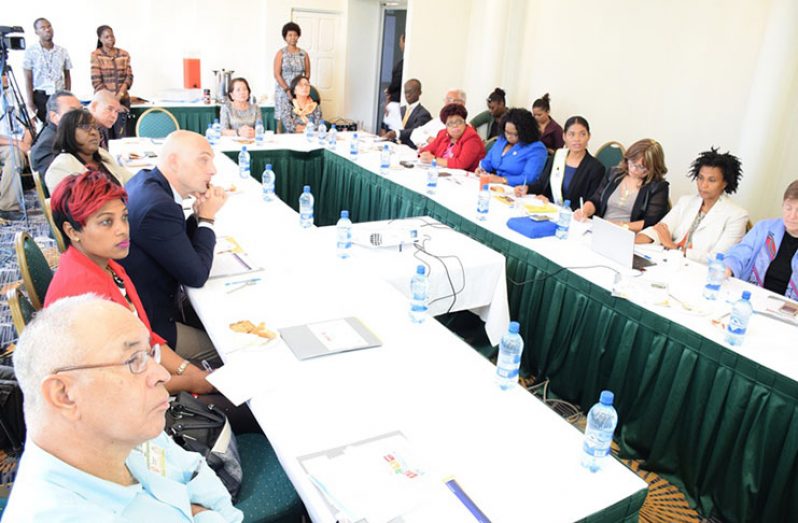The Food and Agriculture Organization (FAO) of the United Nations and the Government of Guyana on Wednesday hosted a panel discussion on the implementation of the Sustainable School Feeding Program in the framework of the zero hunger initiative in Guyana.
The discussion was spearheaded by FAO representative to Guyana, Reuben Robertson who explained that the FAO is working with the government to create more awareness in what to do with food and nutrition security, and some of the vehicles to use collectively to achieve its objective.
In attendance were First Lady, Mrs Sandra Granger; Senior and Junior ministers of Public Health, Volda Lawrence and Dr Karen Cummings;and Minister of Social Protection, Amna Ally, among other officials.
Robertson stated that Guyana, compared to other CARICOM countries, is seen as the country with the most potential for the flight of the school feeding program; despite several issues the country faces.
“Guyana is perhaps, if not the only, among the few that is food self- sufficient; it is a net food exporter. But there is a dichotomy, in the sense that while we have all these potentials and things happening; there are a multiplicity of problems like poverty, unemployment, undernourishment, overweight and obesity and NCDs”.
Robertson noted that Guyana is the leading country with respect to food production and food sustainability compared to other countries. According to the FAO representative in his presentation,the government of Guyana and its stakeholders have recognised the need to address the issues and have taken plausible steps to achieve them”.
As a result, he said government has made several global commitments which includes signing on to the Sustainable Development Goals (SDG) 2030 Agenda, and the country implementation plan of the FAO (which is in progress), Signing on to the Paris agreement on Climate Change to achieve a green state by 2025, and signing on to the International Convention on Nutrition to achieve SDGs, among others.
“Sustainable School Feeding Nutritional programs and SDGs are important components of countries’ social policy, and can contribute directly to the eradication of poverty”, said Robertson. The sustainable School Feeding Program is seen as a vehicle to zero hunger and poverty in Guyana.
Ministers of Public Health, Agriculture, Social Protection and Social Cohesion all voiced their concerns about the factors to be taken into consideration in moving forward with such an initiative. The ministers all supported the idea of a Sustainable School Feeding programme and vowed to work towards making the initiative a government policy.
Robertson’s presentation highlighted that it is a fundamental right for every citizen to have access to food as recognised by the United Nations. He said that School Feeding can be the core of government’s policies to eliminate hunger countrywide. “Why are nutrition sensitive interventions important at schools? This is where we want to ground the sustainable School Feeding, having looked at the challenges, some of the opportunities, what we have committed ourselves to and the multi-disciplinary inter-sectoral, multi-dimensional nature. We want to see how School Feeding really fits into all of this and we are saying here that malnutrition is a global challenge and in Guyana undernourishment is greater than ten per cent.” The FAO Representative said.
Representatives from the Ministry of Education outlined that there are at least five activities executed by the ministry under its school feeding programme. This programme currently provides one healthy meal for at least 22,000 students in 158 schools across Guyana.
These activities include the Breakfast programme, the juice and biscuit for students along the coastland areas, the Dora feeding programme on the Linden/ Soesdyke Highway, the peanut butter and cassava bread programme in Region Nine and the community based school feeding programme in Regions One, Seven, Eight and Nine.
The Ministers of Public Health indicated that the ministry will remain committed to ensure that the quality of meals provided are healthy and are of the right standard which will guarantee total health of children.
Meanwhile, work is continuing to have Food Based Dietary Guidelines (FBDG) which will promote a balanced diet; represented by the six food groups: staples, vegetables, fruits, legumes, animals and fats. Some of the benefits of a sustainable school feeding programme include stronger inter-sectoral co-ordination, development of children’s cognitive skills, encourages at least one healthy meal, promotion of domestic food systems, job creation, elimination of hunger and most importantly poverty reduction.



.jpg)








